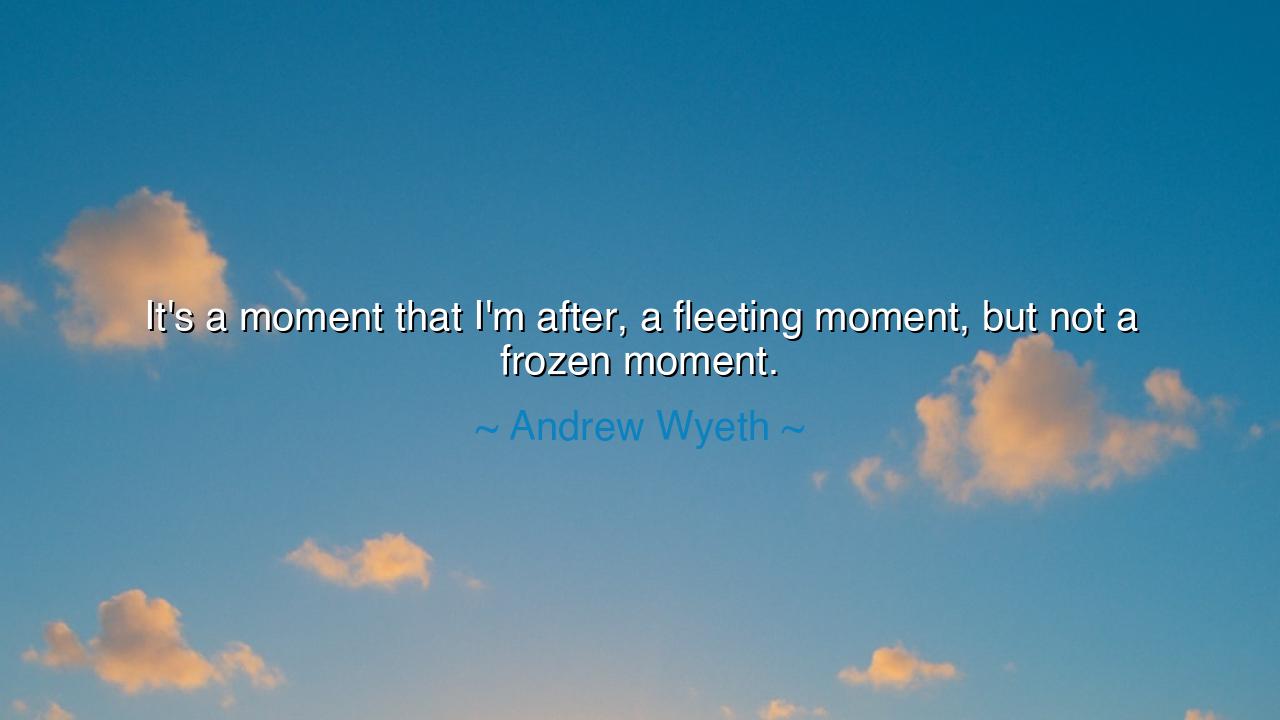
It's a moment that I'm after, a fleeting moment, but not a frozen






“It’s a moment that I’m after, a fleeting moment, but not a frozen moment.”
Thus spoke Andrew Wyeth, the painter of silence and soul, whose brush captured not merely the appearance of life but its invisible breath. In this brief and haunting phrase, Wyeth revealed the heart of his art — and, indeed, of all human experience. He sought not the stillness of things, but the essence of time as it passes, the shimmer between presence and memory, the living pulse that gives meaning to what we see. For a fleeting moment — alive, trembling, and fragile — is more true than any image locked in permanence. It is in movement, not stasis, that the soul is revealed.
Wyeth’s art was born from quiet places — the wind-bent grass of Pennsylvania fields, the weathered wood of old barns, the solitude of country dwellers. He painted not grand scenes, but the mystery within the ordinary, the moment just before or just after something changes. His subjects seemed still, yet behind that stillness lay the hum of unseen life. When he said he was after a “fleeting moment,” he meant that he sought to capture not what the eye beholds, but what the heart feels in the instant of recognition — the sudden awareness that time is passing, that beauty is always in motion, and that to grasp it is to honor its transience.
In this, Wyeth’s wisdom reaches beyond the realm of art. His words speak to the very nature of living. Life itself is a series of fleeting moments, each glowing and vanishing before we can name it. To live well is to feel these moments deeply without clinging to them — to let them move through us like sunlight through leaves. The frozen heart, like the frozen painting, cannot contain life; it only preserves its shadow. To chase the fleeting, however, is to walk with wonder, to accept that meaning is found not in what endures, but in what awakens us briefly and then passes.
Consider the story of Claude Monet, the master of light. In his gardens at Giverny, he painted the same water lilies over and over, not because he wished to freeze them, but because each moment of light revealed a new truth. Morning haze, afternoon fire, twilight calm — all were different worlds, fleeting and alive. Like Wyeth, Monet understood that to grasp beauty is not to imprison it, but to be present as it unfolds. He painted the river as it shimmered, knowing that the next instant would be utterly changed — and that was the glory of it.
There is a sacred humility in this vision. It reminds us that permanence is an illusion, and that the divine often hides in what passes quickly. A smile, a sunset, a kind word, a child’s laughter — these vanish almost as they appear, yet they are more powerful than monuments or fame. The frozen heart seeks control, but the wise heart seeks presence. Wyeth’s fleeting moment is the space where art, love, and spirit converge: not fixed, not owned, but felt. To live this way is to walk in harmony with time itself, rather than against it.
The lesson, then, is this: seek the living moment, not the perfect one. Do not hoard memories like treasures, nor rush through days as though chasing eternity. Pause. See the light upon the face of a loved one, the wind moving through a tree, the silence between words. These are not trivial — they are life itself speaking to you. When you try to freeze them, they fade. When you let them move through you, they transform you. The artist’s way is the way of the soul: to witness, to feel, to let go.
So, my child of breath and time, remember Andrew Wyeth’s wisdom. The world is not to be captured but to be cherished. Let your days be like brushstrokes upon the canvas of the present — fleeting, yet full of meaning. When you meet beauty, do not reach to hold it still; meet it, honor it, and let it pass. For in that passing lies the proof that you were alive, awake, and capable of wonder. The fleeting moment, not the frozen one, is where eternity touches the human heart — and that, indeed, is glorious.






AAdministratorAdministrator
Welcome, honored guests. Please leave a comment, we will respond soon